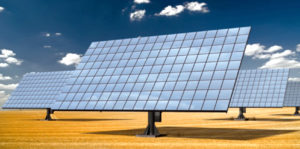
New regulations are part of House Bill 589, aka ‘Competitive Engergy Solutions for North Carolina’
By Dave Vieser. North Carolina has adopted new energy reform regulations aimed at boosting and streamlining the use of solar energy in the state. The rules, which became effective in late July, are structured so that both business and residential electric customers can have better access to so called “clean solar energy” by making purchase of the energy source more competitive.
North Carolina is already ranked second in the nation for overall solar power and solar experts believe the new rules could generate an additional 2.6 gigawatts of new solar power over the next 3-4 years, tripling the current amount of solar power. Duke Energy estimates that, with the new guidelines, its customers will save $850 million in purchased solar power over the next 10 years.
The new regulations will permit for the first time in the state:
• A solar leasing program to allow businesses and residents to purchase renewable energy with little or no upfront costs. Smaller solar installers and homeowners will now be able to initiate lease agreements for residential solar projects which were not allowed previously.
A competitive bidding process for utility scale renewable energy projects, and an independent 3rd party to oversee the bidding process.
Utility customers to participate in community solar programs.
• Installation of solar panels on a small house of less than 1,000 square feet can still run as much as $10,000 in upfront costs, while solar panels on a larger home will cost even more. For that reason, Dave Sawchak, president of Mooresville based Morningstar Enterprises, which specializes in the design, engineering, and installation of solar energy systems, believes the leasing element is an important addition to the state’s regulations.
“Up until now, property owners, such as retirees, who had somewhat limited income streams, were unable to afford the up-front costs of purchasing solar energy systems, “he said. “Now, with leasing permitted, they too can also take advantage of solar energy systems. This will be a welcome addition for both homeoweners and solar energy installers.”
The new solar regulations were adopted as part of House Bill 589, known as “Competitive Energy Solutions for North Carolina.” It received bipartisan support and was finalized after a year of meetings among utilities, clean energy companies, consumer groups and environmental groups.
The legislation was signed into law by Gov. Roy Cooper on July 27. “This legislation will help North Carolina stay ahead with lower cost renewable energy that protects our environment and grows our economy” Cooper said.
In addition to the leasing element, the new regulations will require Duke’s two utilities in North Carolina to seek construction of 2,660 megawatts of solar energy over the next 42 months, which converts to nearly 700 megawatts of new construction a year.
“These changes will make solar energy more affordable and efficient for all customers, while providing a balanced, reliable approach to connecting solar energy onto the grid,“ said Duke’s North Carolina President David Fountain. “They will also help maintain North Carolina’s competitive position as a leader in energy policy and economic growth.”
What the new state regulations don’t address is the patchwork quilt of local regulations pertaining to the installation of solar energy systems. In the Golden Crescent alone, there are a number of different approaches.
For example, in Kannapolis, there are no regulations concerning solar panels or equipment. “They are handled as an accessory structure and typically allowed within five feet of any side or rear property line” said spokeswoman Annette Privette Keller. “They may also be installed on the roof of the home.”
In Cornelius, solar farms are prohibited but solar panels can be installed on any structure or in the rear and side yard, just not the front yard. There are no specific regulations on the panel sizes. It’s another matter, of course, in HOA neighborhoods. Davidson does not regulate solar panels outside of solar farms or the town’s historic district.

Discussion
No comments yet.